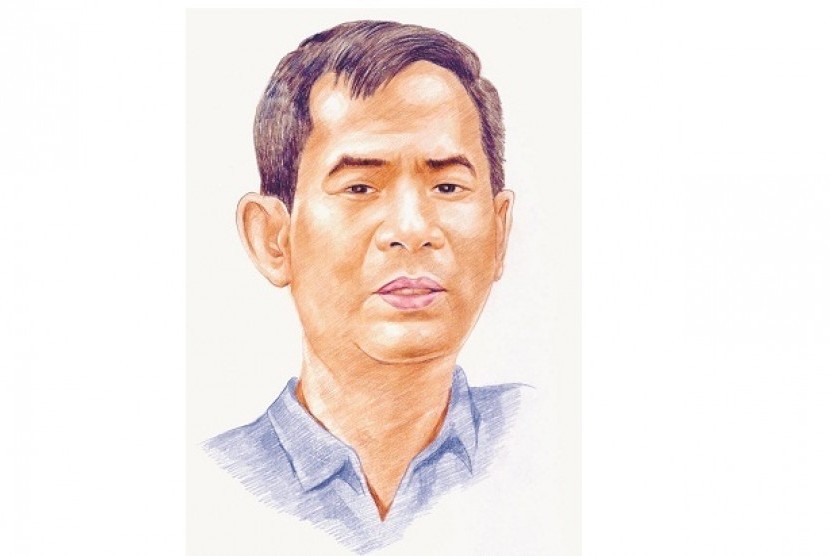By Nasihin Masha
For journalists, Sudomo was a "good" resource. He understood what kind of lead hunted by journalists. When he was chastened with Eddy Tansil case on Bapindo scandal, after being pressed here and there, he firmly said, "I am responsible". The next day it became headline in newspapers. Sudomo also not the typical resource who avoid journalists.
He was also would not the quasi-busy person with rushing style. He took all journalists questions until finished. Although he was a military general, he never showed any body language, verbal language, even his power language, to intimidate journalistsl who asked strong questions toward himself.
All questions were taken calmly, fully vocal, sometimes with chuckles, and confident. Therefore, journalists were enjoying interviewing him. Whereas, who does not know his authority as Commander of the Command for Restoration of Security and Public Order (Pangkopkamtib)? He was known as one of Soeharto's prime bulldozer. He was the operator of Soeharto's political enemies’ dismissal.
He was an important figure for the establishment of Soeharto's authoritarian power. He could arrest, imprison, depoliticize whoever came in the way. He was also known royal on giving "powerful letters" for business continuity. One of them had fatale impact, just like what Eddy Tansil did to rob Bapindo fund.
As a feared ruler, Sudomo also surrounded by love stories with numbers of women and celebrities. His life was full of colours and controversies. Sudomo was almost full in command during the New Order Era (Orba). This was because of his close relationship with Soeharto since he was still a colonel on Mandala Operation. Therefore, he was trusted by Soeharto, started from Head Staff of Command for Restoration of Security and Public Order (Kaskopkamtib), Deputy Commander of Command for Restoration of Security and Public Order (Wapangkopkamtib) on 1973-1978, Commander of Command for Restoration of Security and Public Order (Pangkopkamtib) on 1978-1983, Minister of Labour, Coordinating Minister of Political and Security Affairs, and The Supreme Advisory Council.
He was in the heart of power since the beginning of New Order until he was out completely on 1993. Maybe he was lucky because he was out before Soeharto regime was collapse. He did not get involved on the New Order fall turmoil. At that time he has stepped aside from political life. He was also dimmed out from national stage. He was lost in his personal life and reverted to Islam, whereas when he was in command, he put down many Islamic activists. Such a distinctive contrast.
He really was in the centre of power when he was in Command for Restoration of Security and Public Order (Kopkamtib), an institution established by Soeharto himself. There were party consolidation operation for 1972 election, Malari (15 Januari catastrophy) incident, White Book case (1977/1978), Sapujagat operation, Petition 50 case, and many more.
He was also played as an important actor on rickshaw and street vendor abolition. Also one people could not forget was SDSB (legal public gambling). But he was different to Benny Moerdani or Ali Moertopo, for example. He did not nourish power. He was only Soeharto's loyal figure. Because of that, when there was a conflict among Ali Moertopo (Special Operation), M. Panggabean (Commander of Indonesian National Armed Forces) and Soemitro (Pangkopkamtib) on Malari vortex, he was totaly uninvolved.
When Soeharto then took over Pangkopkamtib position until 1978, Sudomo was trusted as daily task executive. Because, he has always been a loyal figure who never nourished personal power therefore he was more focus on saving Soeharto’s power. He was not as mean as other generals.
He was more flexible and supple on translating Soeharto’s order – although still cannot be called as a democratic or tolerant figure –which is impossible. A number of activists and students acted as the motor of demonstrations were given rooms to study abroad. He also tried to keep giving space for the eliminated political leaders. These were what made Sudomo’s old age relatively calm.
Sudomo was a person who knew so much about how New Order was built and kept. He also clearly understood the intrics and politic competition amongst the generals and political factions around Soeharto. Sudomo’s story could only be born inside a repressive regime. A figure without big narration, known mostly because of his lunge. Because, ideas were extraordinary rights of the dictator, Soeharto. While, on democratic life as nowadays, ideas abudancy were such a blessings.
(Indira Amaranti)


